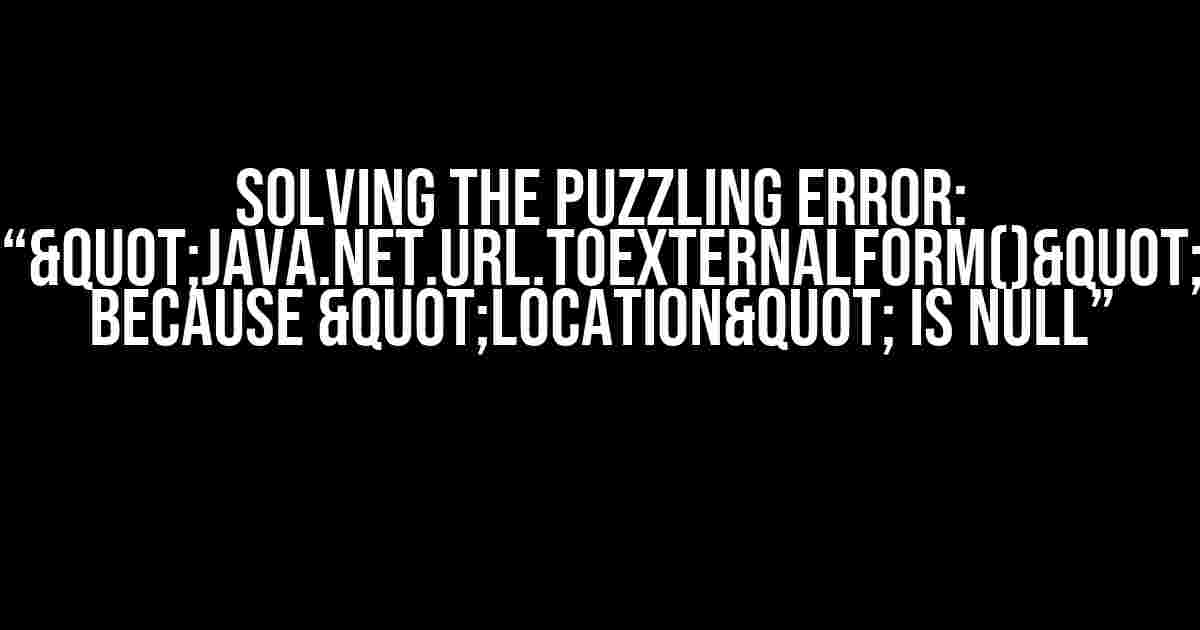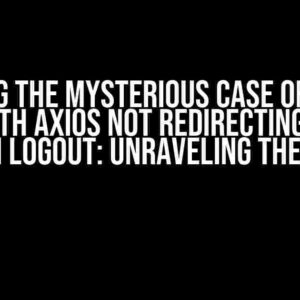Are you tired of encountering the infamous error “"java.net.URL.toExternalForm()" because "location" is null” in your Java application? Do you find yourself scratching your head, wondering what’s causing this issue and how to resolve it? Fear not, dear reader, for we’re about to embark on a journey to uncover the root cause of this error and provide a comprehensive guide to fixing it once and for all.
What is java.net.URL.toExternalForm()?
Before we dive into the error itself, let’s take a step back and understand what `java.net.URL.toExternalForm()` is. The `toExternalForm()` method is part of the `java.net.URL` class, which is used to represent a Uniform Resource Locator (URL). This method returns a string representation of the URL, which can be used to create a new URL object or for logging purposes.
URL url = new URL("http://example.com");
String externalForm = url.toExternalForm();
System.out.println(externalForm); // Output: http://example.comThe Error: “"java.net.URL.toExternalForm()" because "location" is null”
Now, let’s examine the error message we’re trying to resolve. The full error message usually looks like this:
java.lang.NullPointerException: "java.net.URL.toExternalForm()" because "location" is nullThis error occurs when you’re trying to call the `toExternalForm()` method on a `URL` object, but the `location` field is null. The `location` field is an internal field within the `URL` class that represents the URL’s location as a `URI` object.
Why is the "location" field null?
There are several reasons why the `location` field might be null, leading to the error we’re trying to fix. Here are some common scenarios:
- Invalid URL constructor arguments: When creating a `URL` object, you need to provide a valid URL string as an argument. If the URL string is malformed or null, the `location` field will be null.
- Missing protocol: The URL string should include a protocol (e.g., http, https, ftp) to ensure that the `location` field is correctly set.
- Relative URLs: If you’re working with relative URLs, the `location` field might be null because there’s no absolute URL to work with.
Fixing the Error: Step-by-Step Guide
Now that we’ve covered the possible causes of the error, let’s move on to the solutions. Follow these steps to ensure that your `URL` object is correctly initialized and the `toExternalForm()` method works as expected:
- Verify your URL constructor arguments: Double-check that you’re providing a valid URL string as an argument when creating a `URL` object. Ensure that the URL string is not null and includes a protocol (e.g., http, https, ftp).
- Use the correct URL constructor: There are several constructors for the `URL` class. Make sure you’re using the correct one for your use case. For example, `new URL(“http://example.com”)` is a valid constructor call.
- Handle relative URLs: If you’re working with relative URLs, ensure that you’re providing an absolute URL or resolving the relative URL to an absolute one using a `URI` object.
- Check for null values: Before calling the `toExternalForm()` method, verify that the `URL` object is not null and the `location` field is not null.
// Example of correct URL construction
URL url = new URL("http://example.com");
if (url != null && url.getLocation() != null) {
String externalForm = url.toExternalForm();
System.out.println(externalForm); // Output: http://example.com
} else {
System.out.println("Error: URL object or location is null");
}Common Scenarios and Solutions
Here are some common scenarios where the “"java.net.URL.toExternalForm()" because "location" is null” error might occur, along with their solutions:
| Scenario | Error Cause | Solution |
|---|---|---|
| Invalid URL constructor argument | Providing a null or malformed URL string | Verify URL constructor arguments, ensure valid URL string |
| Missing protocol | URL string without a protocol (e.g., http, https) | Include a protocol in the URL string |
| Relative URL | Working with relative URLs without resolving to absolute | Resolve relative URL to absolute using a URI object |
| Null URL object | Failing to check for null URL object before calling toExternalForm() | Check for null URL object and location field before calling toExternalForm() |
Conclusion
In conclusion, the “"java.net.URL.toExternalForm()" because "location" is null” error is a common issue that can be resolved by following the steps outlined in this article. By understanding the causes of the error and implementing the solutions, you’ll be able to successfully use the `toExternalForm()` method and ensure that your Java application runs smoothly.
Remember to always verify your URL constructor arguments, handle relative URLs correctly, and check for null values before calling the `toExternalForm()` method. With these best practices in place, you’ll be well on your way to avoiding this pesky error and writing robust, error-free code.
Additional Resources
If you’re still encountering issues or need further assistance, here are some additional resources to help you troubleshoot and resolve the error:
- Java API Documentation: java.net.URL
- Stack Overflow: NullPointerException when calling toExternalForm on URL object
- Java Tutorial: Reading from and Writing to a URL Connection
By following the guidelines and best practices outlined in this article, you’ll be able to confidently tackle the “"java.net.URL.toExternalForm()" because "location" is null” error and write robust, error-free code. Happy coding!
Frequently Asked Question
Get the inside scoop on “java.net.URL.toExternalForm()” because “location” is null!
What is the main reason behind the “java.net.URL.toExternalForm()” issue due to a null “location”?
The primary reason for this issue is that the “location” field is not initialized or is explicitly set to null. This causes the “toExternalForm()” method to throw a NullPointerException (NPE) because it relies on the “location” field to generate the external URL form.
How can I avoid the “java.net.URL.toExternalForm()” issue caused by a null “location”?
To avoid this issue, ensure that the “location” field is properly initialized before calling the “toExternalForm()” method. You can do this by initializing the “location” field with a valid URL or setting it to a default value if it’s null. Additionally, consider adding null checks before calling the “toExternalForm()” method to prevent NPEs.
What happens when I call “java.net.URL.toExternalForm()” with a null “location”?
When you call “java.net.URL.toExternalForm()” with a null “location”, it will throw a NullPointerException (NPE). This is because the “toExternalForm()” method relies on the “location” field to generate the external URL form, and when it’s null, it cannot perform the necessary operations.
Can I use a default URL or a fallback value when the “location” is null?
Yes, you can use a default URL or a fallback value when the “location” is null. This approach can help prevent NPEs and provide a more robust solution. For example, you can set the “location” field to a default value or use a ternary operator to return a fallback URL when the “location” is null.
Are there any alternative methods or approaches to avoid the “java.net.URL.toExternalForm()” issue?
Yes, you can use alternative methods or approaches to avoid the “java.net.URL.toExternalForm()” issue. For example, you can use the “URI” class instead of “URL” or implement your own custom URL formatting logic. Additionally, consider using Java’s built-in URL encoding and decoding methods to handle complex URL scenarios.






